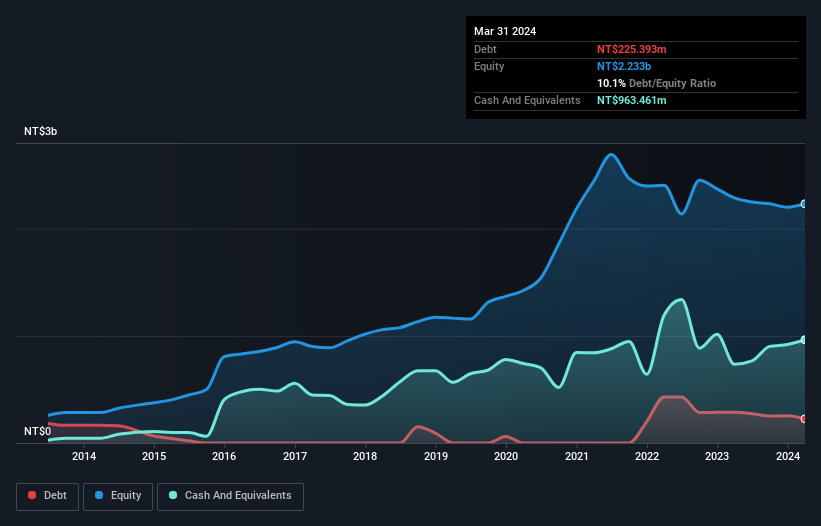- Taiwan
- /
- Semiconductors
- /
- TWSE:4968
Health Check: How Prudently Does RichWave Technology (TWSE:4968) Use Debt?
Warren Buffett famously said, 'Volatility is far from synonymous with risk.' It's only natural to consider a company's balance sheet when you examine how risky it is, since debt is often involved when a business collapses. Importantly, RichWave Technology Corporation (TWSE:4968) does carry debt. But the real question is whether this debt is making the company risky.
What Risk Does Debt Bring?
Generally speaking, debt only becomes a real problem when a company can't easily pay it off, either by raising capital or with its own cash flow. In the worst case scenario, a company can go bankrupt if it cannot pay its creditors. However, a more frequent (but still costly) occurrence is where a company must issue shares at bargain-basement prices, permanently diluting shareholders, just to shore up its balance sheet. By replacing dilution, though, debt can be an extremely good tool for businesses that need capital to invest in growth at high rates of return. When we think about a company's use of debt, we first look at cash and debt together.
See our latest analysis for RichWave Technology
What Is RichWave Technology's Net Debt?
You can click the graphic below for the historical numbers, but it shows that RichWave Technology had NT$225.4m of debt in March 2024, down from NT$287.6m, one year before. However, its balance sheet shows it holds NT$963.5m in cash, so it actually has NT$738.1m net cash.

A Look At RichWave Technology's Liabilities
Zooming in on the latest balance sheet data, we can see that RichWave Technology had liabilities of NT$1.02b due within 12 months and liabilities of NT$81.4m due beyond that. On the other hand, it had cash of NT$963.5m and NT$1.19b worth of receivables due within a year. So it can boast NT$1.06b more liquid assets than total liabilities.
This short term liquidity is a sign that RichWave Technology could probably pay off its debt with ease, as its balance sheet is far from stretched. Succinctly put, RichWave Technology boasts net cash, so it's fair to say it does not have a heavy debt load! The balance sheet is clearly the area to focus on when you are analysing debt. But ultimately the future profitability of the business will decide if RichWave Technology can strengthen its balance sheet over time. So if you're focused on the future you can check out this free report showing analyst profit forecasts.
In the last year RichWave Technology's revenue was pretty flat, and it made a negative EBIT. While that hardly impresses, its not too bad either.
So How Risky Is RichWave Technology?
Although RichWave Technology had an earnings before interest and tax (EBIT) loss over the last twelve months, it generated positive free cash flow of NT$238m. So taking that on face value, and considering the net cash situation, we don't think that the stock is too risky in the near term. We'll feel more comfortable with the stock once EBIT is positive, given the lacklustre revenue growth. When analysing debt levels, the balance sheet is the obvious place to start. However, not all investment risk resides within the balance sheet - far from it. Case in point: We've spotted 1 warning sign for RichWave Technology you should be aware of.
If you're interested in investing in businesses that can grow profits without the burden of debt, then check out this free list of growing businesses that have net cash on the balance sheet.
New: AI Stock Screener & Alerts
Our new AI Stock Screener scans the market every day to uncover opportunities.
• Dividend Powerhouses (3%+ Yield)
• Undervalued Small Caps with Insider Buying
• High growth Tech and AI Companies
Or build your own from over 50 metrics.
Have feedback on this article? Concerned about the content? Get in touch with us directly. Alternatively, email editorial-team (at) simplywallst.com.
This article by Simply Wall St is general in nature. We provide commentary based on historical data and analyst forecasts only using an unbiased methodology and our articles are not intended to be financial advice. It does not constitute a recommendation to buy or sell any stock, and does not take account of your objectives, or your financial situation. We aim to bring you long-term focused analysis driven by fundamental data. Note that our analysis may not factor in the latest price-sensitive company announcements or qualitative material. Simply Wall St has no position in any stocks mentioned.
About TWSE:4968
RichWave Technology
Designs, develops, and sells radio frequency (RF) integrated circuits in Taiwan, China, Korea, and internationally.
Flawless balance sheet with reasonable growth potential.
Similar Companies
Market Insights
Weekly Picks


Crazy Undervalued 42 Baggers Silver Play (Active & Running Mine)


Fiducian: Compliance Clouds or Value Opportunity?

Willamette Valley Vineyards (WVVI): Not-So-Great Value
Recently Updated Narratives

Significantly undervalued gold explorer in Timmins, finally getting traction

Moderation and Stabilisation: HOLD: Fair Price based on a 4-year Cycle is $12.08


Positioned globally, partnered locally
Popular Narratives


MicroVision will explode future revenue by 380.37% with a vision towards success


NVDA: Expanding AI Demand Will Drive Major Data Center Investments Through 2026





